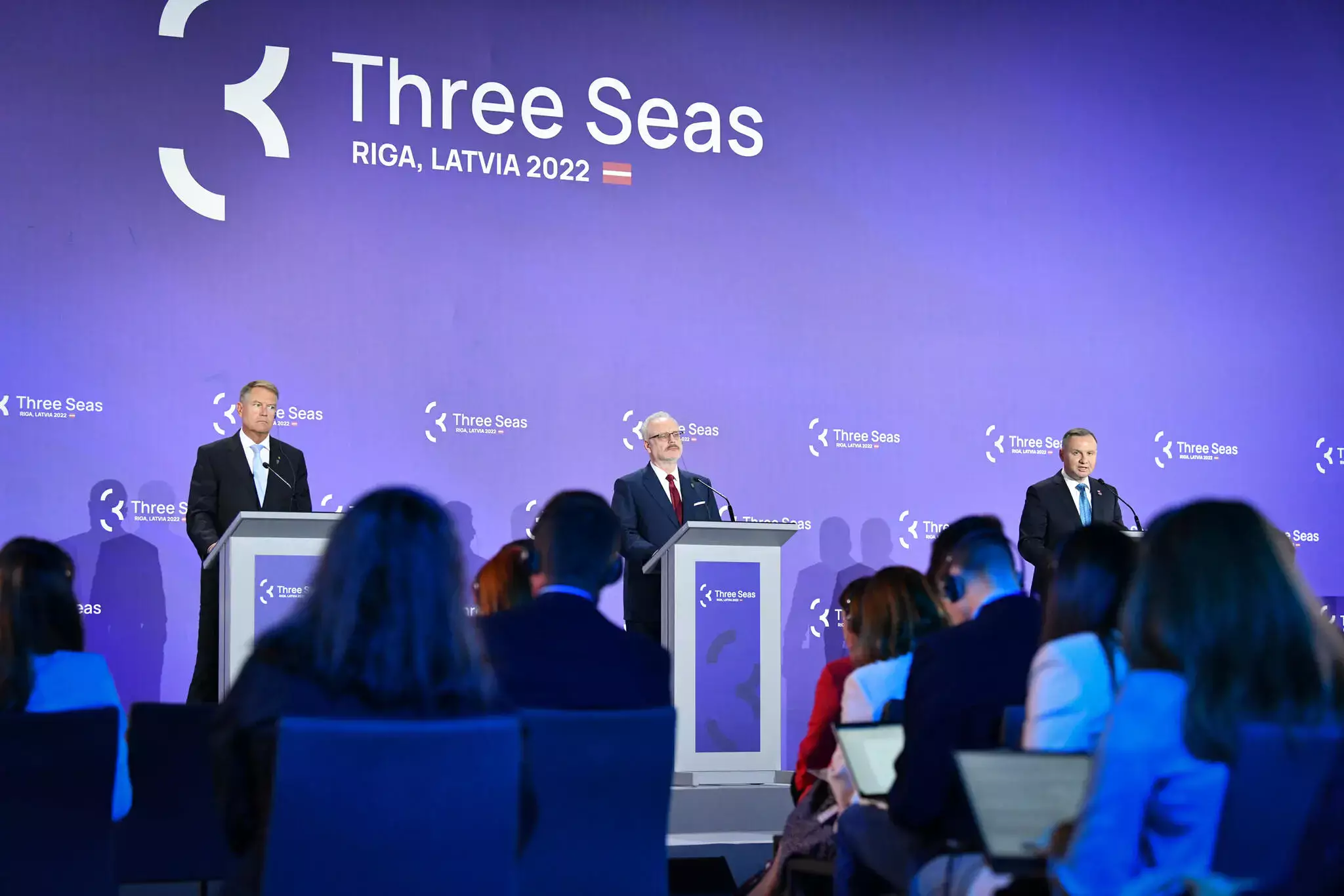OPINIONS
Date: 9 February 2023 Author: Matthew Thomas, Editor and analyst of the Baltic Security Foundation
In June of this year [2022 – ed. note], Three Seas Initiative members and partners met in Riga, Latvia to discuss priorities, investment, and projects of critical importance for the ongoing development of greater regional interconnectedness between the Baltic, Black, and Adriatic Seas.

This initiative, which was launched in 2015 by the Polish and Croatian presidents, aims to improve regional prosperity and security in Central Europe by way of increased cooperation in investment and correcting the infrastructural imbalances left over from the Communist period. In so doing, the initiative will undercut Russian and Chinese pressure and influence in the region through greater integration with the rest of Europe and closer ties with the United States as well. For Latvia, regional cooperation is particularly crucial within the Three Seas format as it seeks – along with its neighbors Estonia and Lithuania – to correct its relative isolation from the rest of its European allies and partners within the EU and NATO.
For Latvia, the financial cooperation component of the Three Seas Initiative is critically important. As part of its overall goals economically, Latvia seeks to persuade member states and the broader EU as a whole to take a more cooperative, rather than competitive, approach to investment policies. It seeks to promote greater investment and specialization in each country’s strengths in order to maximize potential benefits and increase interconnectedness within the region. For Latvia and its Baltic neighbors, regional cooperation in economic and security matters is nothing new. Although regional cooperation has had occasional hiccups in the Baltic experience, the Baltic States understand that as small nations isolated from the rest of Europe, cooperation is essential to their economic prosperity and national security. As such, Latvia considers regional greater regional interdependence a key part of its national strategy to make up for its limitations in resources and correct its geographic disadvantages.
The security dimension to the initiative is crucial for Latvia as well. While most projects have clear economic benefits, many also have crucial implications for national security. During the Communist period, the Soviet Union used energy and transportation infrastructure laid out on an east-west pattern as a tool of subjugation and influence, ensuring that its satellite states would remain dependent on it, while at the same time fueling Western Europe’s dependence on Soviet energy resources. By correcting this imbalance through greater regional integration on a north-south pattern, the Three Seas Initiative has the potential to improve stability and resilience in Central Europe while reducing Russia’s economic influence in the region. This is particularly critical with regard to achieving reduced dependence on Russian energy, as gas supply remains a key tool for Russia’s diplomatic leverage and even coercion in Europe.
For Latvia, energy and transportation infrastructures are major security concerns. Along with Lithuania and Estonia, Latvia is geographically isolated from the rest of the EU and NATO, with the Polish-Lithuanian border at the narrow Suwałki Gap constituting only land connection between the Baltics and their allies. Sandwiched between Russia’s Kaliningrad exclave and Belarus, the Suwałki Gap is of critical military importance, as are the routes that go through it. This gap contains critical connections between the Baltic and Continental European power grids as well as the “Via Baltica” highway, the only north-south route connecting the Baltic capitals with the rest of Central and Western Europe. Improvements to the Via Baltica highway funded under the Three Seas Initiative will not only help facilitate greater trade between the Baltics and the rest of Continental Europe, but will also facilitate greater military mobility in case of crisis. Furthermore, the Rail Baltica project, another high priority project under the initiative, will allow for reduced dependence on the road network while connecting the Baltics rail system with the rest of Europe. This, too, has the potential to improve military mobility in the region, enhancing national security for Latvia and its neighbors.
This year adds a new dimension to the security and strategic components of the Three Seas Initiative with the backdrop of Russia’s war in Ukraine. For Latvia, supporting Ukraine in its fight for national survival is an important part of its broader foreign policy. In adding Ukraine as a partner country, the Three Seas Initiative’s members have expressed interest in helping Ukraine to rebuild after the war and facilitating that country’s improved connections with the broader West. In so doing, the Three Seas Initiative would serve as a tool to better integrate Ukraine into European political, economic, and security structures. For Latvia, the reduction in Russian influence and leverage in Ukraine is a key objective, as Latvia’s own security largely depends on reducing Russian power and influence in Europe.
Overall, the Three Seas Initiative is a key part of Latvia’s strategy for building its economic prosperity and achieving improved national security. By facilitating greater investment in the region, the Three Seas Initiative will help Latvia to grow its economy while also improving its interconnectedness with its allies and partners. Economic prosperity, in turn, enhances security by serving as a stabilizing force in society. Additionally, many projects that directly impact Latvia under the Three Seas Initiative will improve military mobility, enhancing national security. Latvia also stands to gain increased energy independence from Russia with investment coming in for LNG and pipeline projects which will move energy supplies from friendlier sources into the region. Finally, by reducing Russian power and influence in the region, the Three Seas Initiative serves to strengthen Latvia’s independence. As such, Latvia’s participation in and approach to the Three Seas Initiative is highly pragmatic, as it seeks to secure its role in as a free, independent, and integrated member of the broader European community.

Financed by the National Institute of Freedom – Civil Society Development Center as part of the Government Program Civic Initiatives Fund NEWFIO for the years 2021-2030.
Support Us
If content prepared by Warsaw Institute team is useful for you, please support our actions. Donations from private persons are necessary for the continuation of our mission.
All texts published by the Warsaw Institute Foundation may be disseminated on the condition that their origin is credited. Images may not be used without permission.

















